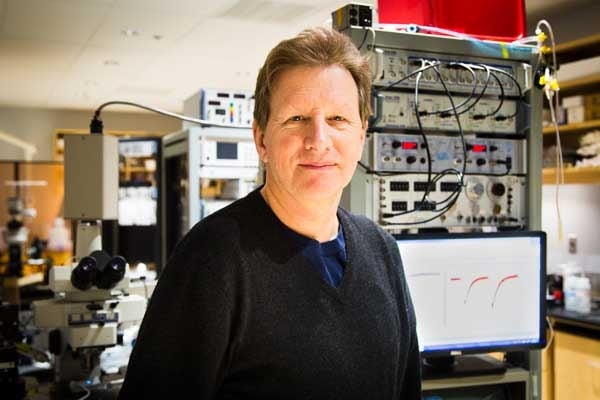
University of Toronto researcher wins “Nobel of Neuroscience”
Published: March 1, 2016
U of T physiology professor Graham Collingridge has been awarded the world’s most valuable prize for brain research.
Collingridge, who chairs the Physiology department in the Faculty of Medicine, was one of three recipients of the Brain Prize, awarded by the Grete Lundbeck European Brain Research Foundation in Denmark, for his research into the mechanisms of memory.
The Brain Prize, which is widely regarded as the “Nobel Prize for neuroscientists”, is awarded annually, and this year Collingridge shares the one million Euro prize with Tim Bliss (London, England) and Richard Morris (Edinburgh, Scotland). The award was announced on March 1, 2016.
Collingridge’s focus is on the brain mechanism known as long-term potentiation (LTP) that underpins the life-long plasticity of the brain. His discoveries, along with those of Bliss and Morris, have revolutionized the approach to understanding how memories are formed, retained and lost. Collingridge has been able to show the mechanism by which LTP is induced, and has developed and applied techniques to identify and describe several of the key molecules responsible for this process.
“I am delighted to share this award,” said Collingridge, who is also senior investigator at the Lunenfeld-Tanenbaum Research Institute, part of the Sinai Health System. “Working on the cellular mechanisms of learning and memory has been both richly challenging and intensely rewarding for me. I am really excited about now translating discoveries about LTP into new treatments for dementia.”
Collingridge’s discoveries are particularly important in the efforts to treat diseases such as Alzheimer’s, in which the efficiency of brain synapses is altered. His work has contributed to a medication that temporarily slows down the progression of the disease.
“Professor Collingridge’s achievements underscore the University of Toronto’s strength in brain science,” Trevor Young, Dean of the Faculty of Medicine, said. “Graham's deeply impressive body of work illustrates our commitment to fundamental neuroscience – and its translation into research that will fight dementia and other intractable brain diseases. I’m so pleased to congratulate Graham on receiving this international recognition.”
Collingridge arrived in Toronto in 2015 from Bristol, England, where he is also a professor of neuroscience in anatomy at the University of Bristol. His lab is based at Mount Sinai Hospital.
“Everyone at the Lunenfeld-Tanenbaum Research Institute is tremendously proud of Graham for this amazing recognition,” said Jim Woodgett, director of the Sinai Health System’s Lunenfeld-Tanenbaum Research and a professor in U of T’s Department of Medical Biophysics. “We were so pleased have attracted someone of Graham’s caliber to the institute last year, and I’m confident that his research will continue to fuel discoveries that impact people’s lives.”



